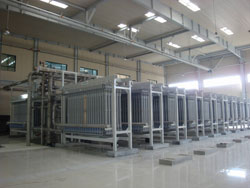Updated filtration products from Siemens increase flexibility and cost effectiveness of water treatment

The reconfigured Memcor CP ultrafiltration product line provides up to 50% more membrane area in the same footprint than previous pressurized module designs. Siemens has also expanded the Memcor XP product line, doubling the flow range to up to 500,000 gallons per day (GPD). Finally, the Trident HSC system has been expanded to include two new sizes between 7.5 and 15 million gallons per day (MGD).
“We are continually upgrading our products to offer customers an even wider range of system choices to cost effectively meet their water treatment needs,” said Stratton Tragellis, Global Director for the “Purified Water Municipal” Segment at Siemens Water Technologies. “The improvements to the Memcor CP and XP ultrafiltration systems will deliver the same high quality effluent while offering a higher flow rate in a smaller system – a win win for the customer.”
The Memcor CP system is a compact pressurized, pre-engineered system with a modular building-block design that reduces installation costs and simplifies operation. The hollow-fiber membranes provide a verifiable barrier, ensuring removal of turbidity, suspended solids, viruses and pathogens. The Memcor CP system is ideally suited for small communities. Now, using Memcor L20V PVdf membranes, the CP system allows for better use of available space, reducing equipment cost by up to 20% compared to earlier CP designs. Three CP models are available that provide 120, 240 and 960 MGD.
The Memcor XP pressurized membrane system is a compact, self-contained filtration system that is shipped fully assembled and factory tested, minimizing integration, installation and startup costs. The updated product line uses L20V membranes, allowing up to 500,000 GPD from one skidded system.
The Trident HSC system is a multi-barrier clarifier with proven coagulation-flocculation technology at high rates to minimize the required footprint. Ideally suited for surface and groundwater treatment, the Trident HSC system uses series-operated stages that reduce incoming contaminants to produce high quality effluent while providing back-up protection for the overall process. In the updated version, the controls have been simplified for distributed flow splitting to the clarifier section. The entire Trident HSC system process train consists of corrosion resistant components of either stainless steel or aluminum.
Memcor and Trident are trademarks of Siemens and/or its affiliates in some countries.
The Siemens Industry Sector (Erlangen, Germany) is the worldwide leading supplier of environmentally friendly production, transportation, building and lighting technologies. With integrated automation technologies and comprehensive industry-specific solutions, Siemens increases the productivity, efficiency and flexibility of its customers in the fields of industry and infrastructure. The Sector consists of six divisions: Building Technologies, Drive Technologies, Industry Automation, Industry Solutions, Mobility und Osram. With around 207,000 employees worldwide (September 30), Siemens Industry achieved in fiscal year 2009 total sales of approximately €35 billion.
The Siemens Industry Solutions Division (Erlangen, Germany) is one of the world's leading solution and service providers for industrial and infrastructure facilities comprising the business activities of Siemens VAI Metals Technologies, Water Technologies and Industrial Technologies. Activities include engineering and installation, operation and service for the entire life cycle. A wide-ranging portfolio of environmental solutions helps industrial companies to use energy, water and equipment efficiently, reduce emissions and comply with environmental guidelines. With around 31,000 employees worldwide (September 30), Siemens Industry Solutions posted sales of €6.8 billion in fiscal year 2009.
Media Contact
All latest news from the category: Trade Fair News
Newest articles

Innovative 3D printed scaffolds offer new hope for bone healing
Researchers at the Institute for Bioengineering of Catalonia have developed novel 3D printed PLA-CaP scaffolds that promote blood vessel formation, ensuring better healing and regeneration of bone tissue. Bone is…

The surprising role of gut infection in Alzheimer’s disease
ASU- and Banner Alzheimer’s Institute-led study implicates link between a common virus and the disease, which travels from the gut to the brain and may be a target for antiviral…

Molecular gardening: New enzymes discovered for protein modification pruning
How deubiquitinases USP53 and USP54 cleave long polyubiquitin chains and how the former is linked to liver disease in children. Deubiquitinases (DUBs) are enzymes used by cells to trim protein…



